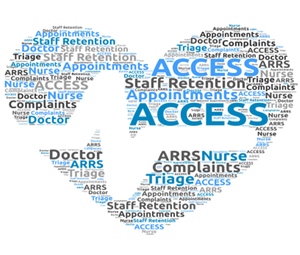
Oh no, not another access article I hear you cry - and I feel your pain, it is one area which consumes so much of everyone’s time and nothing you do seems to make a difference. It is also the one area which has the most impact on patients, your staff and you ultimately you. So what can we do …
Before we go on, this isn’t about hitting targets - this is about reducing patient dissatisfaction and complaints, it’s about improving staff morale and helping you to retain good staff, it’s about making the most of the appointments you have.
We have to change public perception - ultimately general practice is the gateway to healthcare. Patients are our ‘clients’, without them we do not have a business, and patient satisfaction is plummeting - “it is harder to make an appointment”, “wait times are longer” and “the appointment is not with who I want to see or it is not the type of appointment I wanted”. We have to know what the exact problem is before we can fix it.
Monday mornings will always be busy as the practice has been shut for 2 days - this morning at 8.27am, Elsie was no. 30 in the queue and held on for 47 minutes. I know this can’t be helped but it made Elsie feel really agitated and by the time she got through, she was not her usual bubbly self, in fact she was feeling quite grumpy. Your staff, having already spoken to many patients already, now have to deal with grumpy Elsie, also knowing there are still many more patients waiting behind Elsie who also want appointments and who will also be not at their best when they eventually get through. Elsie was offered an appointment with a nurse practitioner; suspecting she has an infection, Elsie is not happy with this as nurses can’t prescribe, so Elsie believes, and it is likely she will need a prescription.
Would an online triage system help? Many practices now operate an online triage form, all forms are reviewed by clinicians each day so people who need appointments get them, with the most appropriate HCP. This can also mean a lot of patients/queries can be signposted elsewhere - pharmacy, social prescriber to name but a few. Not everyone will be able to complete an online form, those who call in the form is completed by a receptionist. Cutting your Monday morning calls down by 50% or more will ensure Elsie is less grumpy when she gets through, there is time to explain to Elsie the nurse practitioner can prescribe and suddenly everything starts to feel more manageable.
Now didn’t I make that sound easy - if it was easy, we’d all be doing it. Change, and this is significant change as it involves so many people, is never easy but it has to change. And in order for it to work, you have to get everyone on board, why is this change happening, ensure all staff know it is for their benefit too, involve staff members who are reluctant to change and listen to their views (get the difficult or reticent of staff members on your side, it’s so much easier when they are a supporter!) and ensure everyone knows their part.
And once you have a plan, communicate it to the patients, every which way you can, giving as much notice as possible for any changes, ensuring you and your staff can talk to patients beforehand to put their minds at rest. Don’t take it personally when patients don’t seem to get behind you, remain passionate and firm about the changes whilst being empathetic to their worries. Get leaflets printed detailing all the different HCP’s available, who are they, what do they do, why would you be offered an appointment with them? Give a batch of leaflets to your local pharmacists to give out to patients, spread the word. Introduce an ARRS role each week on social media and create resources for your website about the different roles and different services who could be involved in their care, such as Pharmacy First.
And finally, if it doesn’t work first time, try and try again, it will be worth it.
